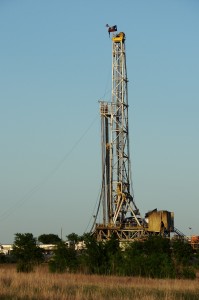What’s in Fracking Fluid? Texas Will Now Have an Answer

This rig uses hydraulic fracturing to obtain gas from Texas' Barnett Shale formation. Photo courtesy of KUT News.
The Railroad Commission of Texas, which oversees drilling in the state, passed new rules requiring the disclosure of chemicals used in hydraulic fracturing (“fracking”) today. The rules were proposed by the state legislature earlier this year and signed into law by Governor Rick Perry this summer. Companies will have to disclose on the website FracFocus what chemicals they use for fracking in Texas.
Any wells that have an initial drilling permit from February 1, 2012 on will have to make the disclosure. The commission notes in a release that “before the rule passed, Texas operators conducting hydraulic fracturing were voluntarily entering chemical data into the public website FracFocus for about half of all wells in Texas undergoing hydraulic fracturing,” the commission said in a statement.
“We finally adopted the final regulation today, which I’m very happy of,” Commissioner David Porter told StateImpact Texas after the meeting. “Back in May when the legislation was passed I said we can get this done within a year. And a I got a lot of pushback. A lot of people said, no we can’t get it done that fast. But here staff has got it done in 7 months and we voted on it and adpoted it today.”
FracFocus is a public website, a joint project between the Interstate Oil & Gas Commission and the Groundwater Protection Council, both of them multi-state government agencies. You can see a map of wells currently disclosing chemicals used in fracking in Texas on the FracFocus website.
“I think it’s a great day,” chairman Elizabeth Ames Jones told StateImpact Texas. “It’s a great day for Texas because we are showing leadership in the best practices in the safe and responsible and exploration production or our energy and in this specific case its oil and natural gas.”
A draft study by the Environmental Protection Agency released Thursday found a link between fracking and groundwater contamination at a drilling site in Pavillion, Wyoming. The natural gas industry was quick to respond with attempts to discredit the report. And residents near some drilling sites in Fort Worth are concerned about the fracking fluids possibly contaminating their water supply. A recent study by the University of Texas found no direct link between the practice and contaminated water underground.
But the study did find that surface spills related to drilling and fracking had an effect: “many allegations of groundwater contamination appear to be related to above-ground spills or other mishandling of wastewater produced from shale gas drilling, rather than from hydraulic fracturing itself,” the study’s preliminary findings say.
StateImpact Texas attended the meeting today and will report more soon.


